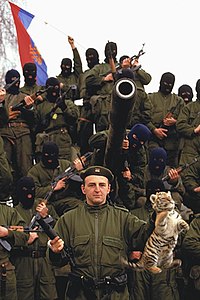Željko Ražnatović (Serbian Cyrillic: Жељко Ражнатовић, pronounced [ʒêːʎko raʒnâːtoʋitɕ]; 17 April 1952 – 15 January 2000), better known as Arkan (Serbian Cyrillic: Аркан), was a Serbian warlord, mobster and head of the Serb paramilitary force called the Serb Volunteer Guard during the Yugoslav Wars, considered one of the most feared and effective paramilitary forces during the wars.[2] His paramilitary unit was responsible for numerous crimes in Eastern Bosnia, including murder, pillaging, rape and ethnic cleansings.[3]
He was on Interpol's top ten most wanted list in the 1970s and 1980s for robberies and murders committed in countries across Europe,[4][5] he escaped jail twice,[4] and was later indicted by the International Criminal Tribunal for the former Yugoslavia for crimes against humanity. Up until his assassination in January 2000, Ražnatović was the most powerful organized crime figure in the Balkans,[6] as well as the most powerful state-sponsored gangster in Serbia.[7]
- ^ "Arkan Dead". NPR.org.
- ^ Balkan Battlegrounds: A Military History of the Yugoslav Conflict, 1990-1995. Central Intelligence Agency, Office of Russian and European Analysis. 2003. p. 209. ISBN 978-0-16-066472-4.
- ^ Spitka, Timea (2016). International Intervention, Identity and Conflict Transformation: Bridges and Walls Between Groups. London New York: Routledge, Taylor & Francis Group. p. 80. ISBN 978-0-8153-6518-1.
- ^ a b Bartrop, Paul R. (2012). A Biographical Encyclopedia of Contemporary Genocide: Portraits of Evil and Good. Santa Barbara, Calif: ABC-CLIO. pp. 270–271. ISBN 978-0-313-38678-7.
- ^ Dzuro, Vladimír (2019). The Investigator: Demons of the Balkan War. Lincoln: Potomac Books, An imprint of the University of Nebraska Press. p. 211. ISBN 978-1-64012-195-9.
- ^ Glenny, Misha (2012). The Balkans: Nationalism, War, and the Great Powers, 1804–2011. New York, NY: Penguin Books. p. 675. ISBN 978-0-14-242256-4.
- ^ Ramet, Sabrina P.; Pavlakovic, Vjeran, eds. (2005). Serbia Since 1989: Politics and Society under Milosevic and After. University of Washington Press. p. 218. ISBN 978-0-295-98538-1.
